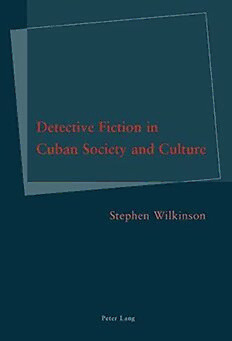
Detective Fiction in Cuban Society and Culture PDF
Preview Detective Fiction in Cuban Society and Culture
Detective Fiction in Cuban Society and Culture Detective Fiction in Cuban Society and Culture Stephen Wilkinson PETER LANG Oxford (cid:129) Bern (cid:129) Berlin (cid:129) Bruxelles (cid:129) Frankfurt am Main (cid:129) New York (cid:129) Wien Bibliographic information published by Die Deutsche Bibliothek Die Deutsche Bibliothek lists this publication in the Deutsche Nationalbibliografi e; detailed bibliographic data is available on the Internet at ‹http://dnb.ddb.de›. British Library and Library of Congress Cataloguing-in-Publication Data: A catalogue record for this book is available from The British Library, Great Britain, and from The Library of Congress, USA ISBN 3-03910-698-8 US-ISBN 0-8204-7963-2 © Peter Lang AG, International Academic Publishers, Bern 2006 Hochfeldstrasse 32, Postfach 746, CH-3000 Bern 9, Switzerland [email protected], www.peterlang.com, www.peterlang.net All rights reserved. All parts of this publication are protected by copyright. Any utilisation outside the strict limits of the copyright law, without the permission of the publisher, is forbidden and liable to prosecution. This applies in particular to reproductions, translations, microfi lming, and storage and processing in electronic retrieval systems. Printed in Germany Contents Acknowledgements 7 Introduction: Why study detective fiction? 9 1. The relationship between literature and society: a theoretical framework 19 2. Nationalism, Marxism and sacrifice: Cuban revolutionary ideology and the Cuban state 33 3. Ideology and intervention: understanding Cuban revolutionary cultural policy 53 4. Bad black men and comical Chinese: the Cuban detective narrative 1915–1959 81 5. Justice beyond legality: the early development of the revolutionary Cuban crime novel 109 6. Socialist heroes and capitalist villains: the Cuban revolutionary crime genre 1971–1991 123 7 The crash of the 1990s and the challenge to modernity: how crime narrative changes to ‘fit’ the times 159 8. Irony, paradox and temporality: Sartrean morality in Pasado perfecto 189 9. Critiques of sexual and political intolerance in the novelMáscaras and the film Fresa y chocolate 217 10. From existentialism to postmodernity: the aesthetic of doubt in Vientos de cuaresma and Paisaje de otoño 251 Conclusion 283 Bibliography 289 Index 309 6 Acknowledgements My thanks must first of all go to Professor Catherine Davies for her invaluable help and advice. To Verity Smith for her suggestions and support, to Jo Labanyi for having suggested the topic in the first place, and to my partner, Claudia Guerretta, for having the trust, love and generosity to pay the bills and endure the process with me. I must also acknowledge the British Academy for the three years of funding they provided towards my PhD thesis upon which this work is based. In Cuba, I must thank Leonardo Padura Fuentes and Daniel Chavarría in particular for their help and advice. I must mention also the help of Rolo Lázaro and the staff at the Biblioteca Nacional José Martí, as well as the staff at the headquarters of UNEAC, the Cuban Union of Writers and Artists. My thanks are also due to Ernesto and Estela Bravo and the staff at the public relations department of Cuban television. I am grateful also for the advice, help and guidance from among many others: Luis Adrián Betancourt, Imeldo Alvarez, Arnaldo Correa, Justo Vasco, Ron Ridenour, Ana Cairo, Salvador Redonet Cook, Rodolfo Valero, Amelia S. Simpson, Armando Cristóbal Pérez and Julio Travieso. I owe a debt of gratitude to the staff of Hispanic Studies Department at Queen Mary and Westfield College, London and in particular, Professors Alan Deyermond and Ralph Penny, and Kay, the department secretary. My thanks also to the staff at the Senate House, University of London, and QMW libraries for all their patience and guidance. Elsewhere, I am grateful to Professor Antoni Kapcia and Dr Jan Kraniauskas and all those who responded to papers I have given on subjects covered in this book at conferences and seminars in London, Newcastle, Leeds, Liverpool, Cambridge, Halle (Germany), Manchester and Middlesex. Stephen Wilkinson, London, 31 October, 2005 Introduction Why study detective fiction? Detective or crime-related fiction is a cultural phenomenon that has few commercially successful rivals. In Britain, only the romance fiction of publishers such as Mills and Boon has greater sales than crime novels. On the five terrestrial British television channels in one week of 2005 there were no less than twenty hours of shows with a police, crime or espionage theme.1 Such is the popularity of this genre that even the products of crime fiction’s earliest exponents such as Edgar Allen Poe and Sir Arthur Conan Doyle are endlessly republished, recreated in new media, translated and marketed throughout the world.2 Along with the latest offerings these, and other ‘giants’ of the genre, such as Raymond Chandler, Dashiel Hammett and Agatha Christie, are still to be found on the shelves of bookstores at airports and railway stations. As detective fiction historian Julian Symons remarks, Sherlock Holmes became a myth […] so potent that even in his own lifetime Doyle was almost swamped by it, and the myth is no less potent today. Criminal and emotional problems are still addressed to Holmes for consideration, and pilgrimages are made to his rooms at 221B Baker St. (1992: 73) The detective genre is so successful that it has become the subject of serious consideration. A popular cultural form that occupies the minds of so many people for so long, that crosses cultural boundaries so easily (there is a Sherlock Holmes society in almost 1 TV Times, 26 April–2 May 2005. IPC Publishing, London. 2 Conquest (1990) lists 952 authors, 176 feature films, 164 television serials, 56 radio programmes and 1,563 detective characters in the English language alone. The British National Bibliography (1998) classifies as ‘detective and mystery stories’ 2,189 titles published in Britain between 1995 and 1998. By comparison, 3,989 titles are classified as ‘love stories’ published over the same period.
